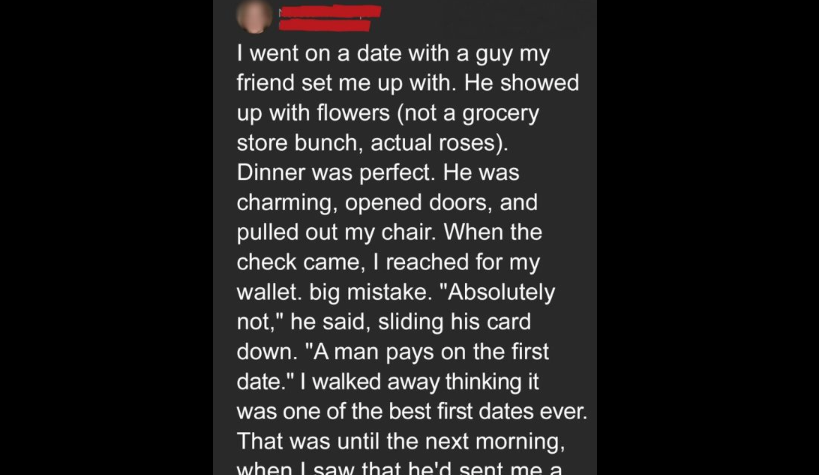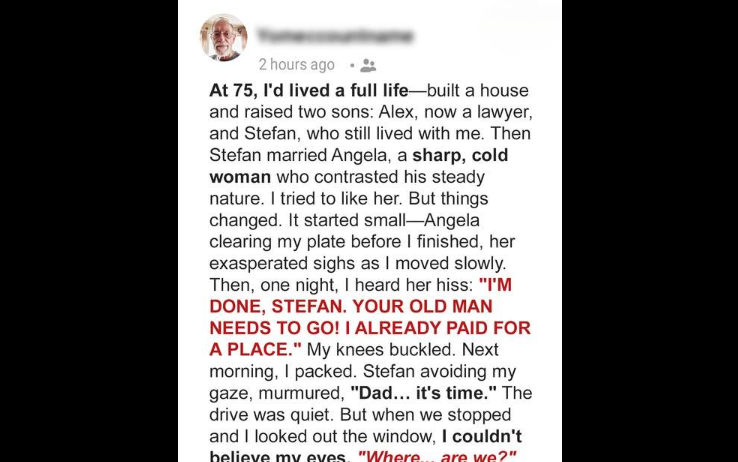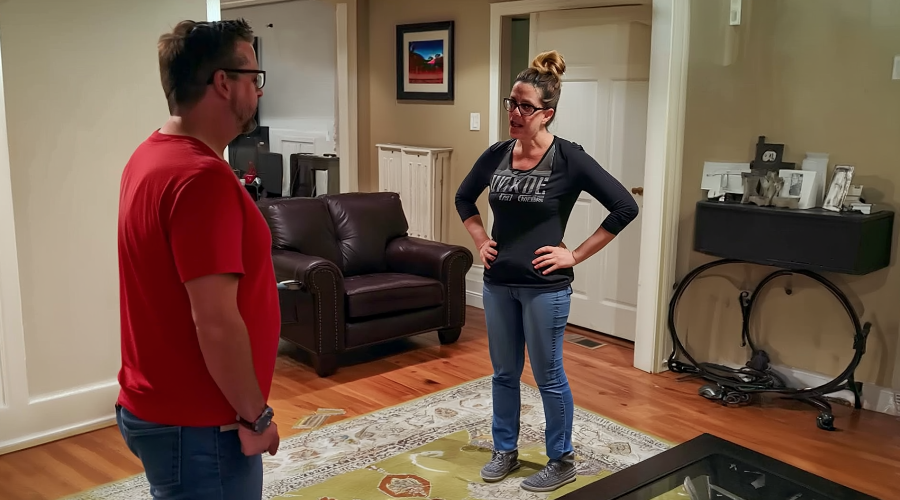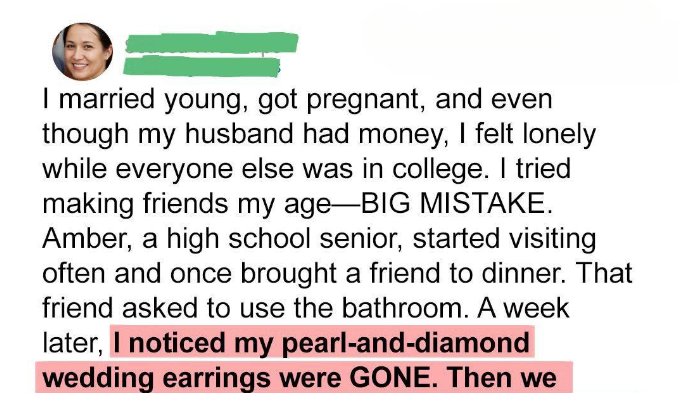I went on a date with a guy my friend introduced me to. He arrived with a bouquet of roses, not some hastily grabbed grocery store flowers, but genuine, vibrant roses. The dinner unfolded beautifully. He was charismatic, held doors open, and even pulled out my chair. When the bill arrived, I instinctively reached for my purse. That was a misstep. “No way,” he declared, smoothly placing his card on the table. “A gentleman covers the first date.” I left the restaurant convinced it was one of the most memorable first dates I’d ever experienced.
The next morning, however, I woke up to a Venmo request from him—for exactly half the dinner cost.
At first, I assumed it was a playful jest. The note attached read: “Your thank-you was sweet, but gratitude doesn’t cover the tip.”
I stared at my phone, chuckling, thinking he might be pulling a prank. Then I saw the amount: $67.48. Precisely half the bill, down to the cent. Not a lighthearted token amount, not rounded for simplicity—he genuinely expected me to split the cost after insisting on paying.
I snapped a screenshot and sent it to my friend Faria, who had arranged the date. Her response came quickly: “Hold on, WHAT? That’s absurd. I thought he was all about classic romance?”
“Apparently only until the bill arrives and he reconsiders his choices,” I texted back.
I chose to ignore the Venmo request. Two hours later, he sent a follow-up message:
“Hey, just checking you saw my Venmo. I value equality in relationships, hope you get that.”
Equality? He had outright refused to let me contribute the night before. Now he was billing me like I was a rideshare fare?
I stayed composed and replied:
“I thought you were firm on not splitting first dates. You made that very clear.”
His response was immediate:
“I am. But I also don’t believe in being used. By the way, you ordered the truffle pasta.”
My jaw practically hit the floor. The truffle pasta? Was this for real?
I could have unleashed a fiery comeback. I could have gone full-on verbal takedown. But a quiet instinct urged me to pause.
Instead, I messaged Faria again: “Your guy just sent me an invoice for truffle pasta.”
She called, laughing so hard she could barely speak. “I’m so sorry! I genuinely thought he was decent. I had no clue he was like this.”
“He brought roses,” I said. “Actual roses!”
Faria sighed. “He’s one of those guys who treats dating like a chess match. All the right moves, but it’s calculated underneath. I thought he’d matured past that.”
I deleted the Venmo request and blocked his number.
I hoped that would be the end of it.
The next day, he tagged me in a public Instagram story—public—with the caption:
“Don’t be fooled by charm. Some women are only after a free meal. #trufflehunter #lessonlearned”
Accompanied by a GIF of a gold digger wielding a shovel.
I hadn’t even responded, and he was already painting me as the villain online.
Now I was furious. I sent the story to Faria. “I’m about to call him out. Unless you want to handle this?”
She replied, “Give me a moment.”
Ten minutes later, she texted:
“Update: I just spoke to his sister. This isn’t his first stunt like this. Apparently, he keeps a spreadsheet tracking his dates, expenses, and whether they’re ‘worth it.’”
A spreadsheet.
I was speechless.
“He calls it his ‘ROI of romance,’” she continued. “His sister says he has columns for time spent, money shelled out, and even ‘emotional investment.’”
“That’s unhinged,” I replied.
“Yeah. She offered to confront him, but I’m tempted to grab popcorn instead.”
I should have let it go. Should have left it there.
But no. He’d dragged my name through the mud online. I needed to set the record straight.
So I posted my own Instagram story, keeping it anonymous and untagged, just a straightforward recount:
“Went on a date. He insisted on covering the bill. Next day, he Venmo’d me for half and posted a story calling me a gold digger. Over truffle pasta. Do better.”
The post took off.
Friends and strangers alike began sharing it. My DMs overflowed—some people laughed, others were outraged on my behalf. A few even sent me screenshots of their own encounters with him.
One woman, Priya, messaged: “Hold up. Is this guy named Milan? Went to Vassar? Drives a black Audi?”
“YES,” I responded.
She sent a crying emoji, then elaborated:
“He did the exact same thing to me. Ordered a pricey bottle of wine, insisted on paying, then sent me a Google Doc breaking down ‘my share’—including the Uber to the restaurant.”
I couldn’t believe this was a pattern.
Within a day, five other women reached out. Same guy, same story.
The final blow came when Talia sent me a screenshot of an email he’d sent her the previous year, titled: “A Recalibration of Expectations.”
I nearly choked.
Who sends that after a date?
Talia had gone on three dates with him. He ghosted her, then emailed her claiming he was “reassessing the cost-benefit balance” of continuing to see her.
It was written like a corporate memo.
I was done staying silent.
With their permission, I gathered anonymous snippets from all six women and created a TikTok—no names, no faces, just a voiceover reading their messages while zooming in on receipts:
– “He sent me a Venmo for exactly $38.22.”
– “He calculated a tip based on how much wine I drank.”
– “He requested reimbursement for a Lyft he didn’t even take.”
The caption read:
When a guy turns dating into a ledger, RUN.
By the next morning, the video had 75,000 views. Then it surged to 250,000. Comments poured in.
People were livid. Some joked he should just marry his spreadsheet. A few even guessed his identity.
But the real plot twist?
His boss saw the video.
Someone at his company recognized his car and voice from a podcast he’d done about “tech efficiency.” They forwarded the video to HR.
It might seem extreme, but apparently, he’d also been sharing his dating philosophies with female interns—during work hours.
Two weeks later, his sister messaged me again:
“Hey… so he’s on ‘leave.’ The video caused a stir. I’m really sorry. I’ve tried talking to him, but he doesn’t listen to women—not even me.”
I thanked her. My goal wasn’t to get him fired. I just wanted him to stop weaponizing generosity.
The roses, the charm, the chivalry—it was all a performance to create a false sense of trust. Then he’d flip the script and shame you for accepting what he offered.
It was never about the meal. It was about power.
Months later, after the dust settled, Talia—one of the women he’d dated—reached out. “Want to grab coffee? Trauma bonding,” she joked.
We met up, talked for hours, and shared stories—not just about him, but about other men who made us feel like we were too much, too little, too costly, too emotional.
It was strangely cathartic.
Now, a year later, we’re genuine friends—the kind who laugh until we can’t breathe. She even helped me move into my new apartment last month.
I’ve dipped my toes back into dating, cautiously. One guy, Levan, stood out. Quiet, considerate. On our second date, I offered to split the bill. He didn’t make a grand gesture. Just smiled and said, “If you want, we can alternate.”
No theatrics. No passive-aggressive follow-ups. Just a mature exchange.
We’ve been together for seven months now.
Here’s what I’ve learned:
True kindness doesn’t keep a tally.
If someone extends warmth only to penalize you for accepting it, that’s not love. It’s manipulation dressed in a pressed shirt.
Authentic affection doesn’t come with a bill.
So if you’re navigating the dating world—trust people’s actions, but don’t overlook the evidence. Sometimes, the receipts reveal the true story.
If this story struck a chord, share it with someone who needs a reminder: you’re not “too much” for expecting respect. You’re simply too authentic for those who treat love like a balance sheet.




